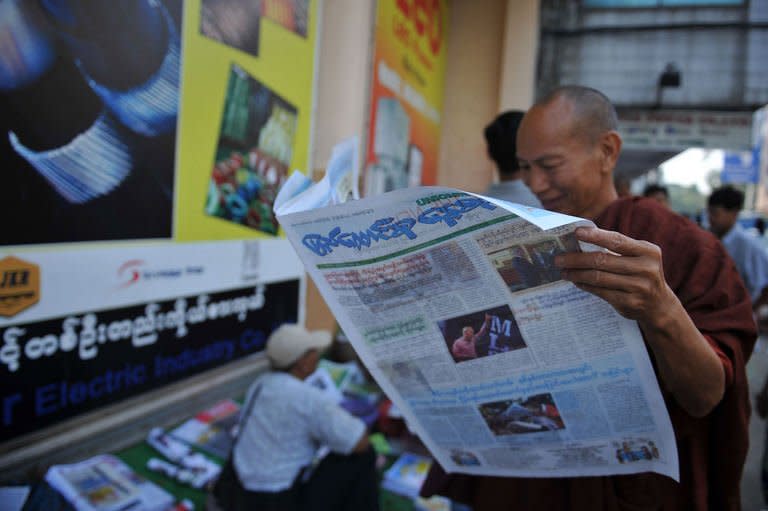Daily papers transform Myanmar news stands
Privately owned daily newspapers hit Myanmar's streets Monday for the first time in decades under new freedoms that represent a revolution for a media industry which was shackled under military rule. Four Burmese-language titles -- The Voice, The Golden Fresh Land, The Union and The Standard Time -- made the transition from weeklies as new rules came into effect that swept away state media's long monopoly on daily printing. "We prepared for about six months to become a daily newspaper. We wanted to be part of this historical milestone," Aung Soe, an editor of The Voice, told AFP. News stands in Yangon reported an early morning rush by readers eager to witness the latest sweeping change in the country also known as Burma. "The Voice daily sold out soon after it arrived even though I ordered double the amount than other newspapers. People are keen to read private daily newspapers for the first time," said vendor Phyu Phyu. Myanmar's public has become accustomed to an increasingly boisterous media since the country's quasi-civilian government relaxed its grip on the press after coming to power in 2011 and introduced other wide-ranging reforms. Military rulers had seized control over private daily papers in 1964, according to veteran journalist Thiha Saw of Open News weekly. Under junta rule, even an implied mention of the democracy movement and its figurehead Aung San Suu Kyi could have landed reporters in prison, but the Nobel laureate is now in parliament and regularly appears in the papers. Draconian pre-publication censorship was officially scrapped in August, but private weeklies had already started pushing the boundaries of their freedom with reports on sensitive issues and news updates posted daily on social media. A total of 16 weekly journals were allowed to become dailies under the new rules, including Suu Kyi's party paper, but logistical challenges mean some were not able to make the move immediately. Among the front pages of the new dailies on Monday, the fragrantly titled Golden Fresh Land -- also a sell-out at many news stands -- covered an upcoming trip by Suu Kyi to Japan and President Thein Sein's address to the nation about recent Buddhist-Muslim unrest. The Union, which is close to the ruling party, focused on news from the capital Naypyidaw. The Voice printed an update on the situation in the western state of Rakhine -- the scene of deadly communal strife last year -- and a report on a weekend concert in Yangon by Danish band Michael Learns to Rock. Myanmar jumped to 151st out of 179 in Reporters Without Borders' 2013 World Press Freedom Index because of "dramatic changes" that included scrapping its harsh pre-publication scrutiny regime -- until last year imposed on everything from newspapers to fairy tales. Observers hope that a new media law being drafted by an interim press council will define the limits of press freedoms and replace harsh junta-imposed legislation. But authorities recently revealed they had written their own proposal, stoking fears that government is unwilling fully to relinquish control. News groups also complain that the state press enjoys unfair advantagaes in funding and advertising. While private journals sell for around 200 kyats (about 20 US cents), Myanmar's three government-backed newspapers are half the price or less and many copies are distributed free at hotels and on aeroplanes. The English-language New Light of Myanmar is now looking for a private partner and prints Hollywood gossip in place of the shrill pronouncements of the past -- which targeted the "killer broadcasts" of foreign media like the BBC. On the streets of Yangon Monday opinion was divided about the prospects for private daily papers. "We worry that they will not be able to continue in the long term -- people can't afford to buy all of them because the newspapers now come out at the same time," Kalar Lay told AFP. But fellow newspaper seller Win Myint said the recipe for success was simple: "If the reporting is good, people will buy it and read it."




